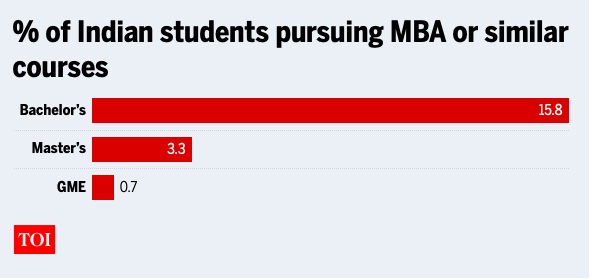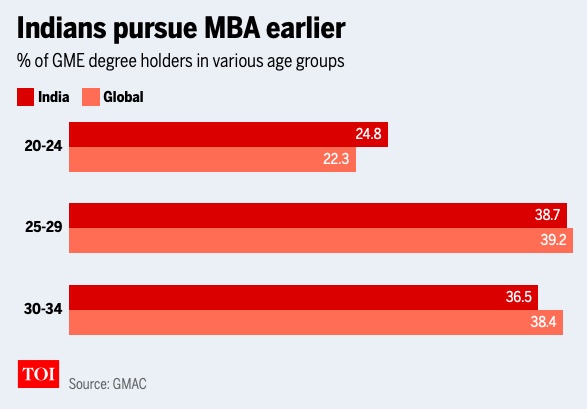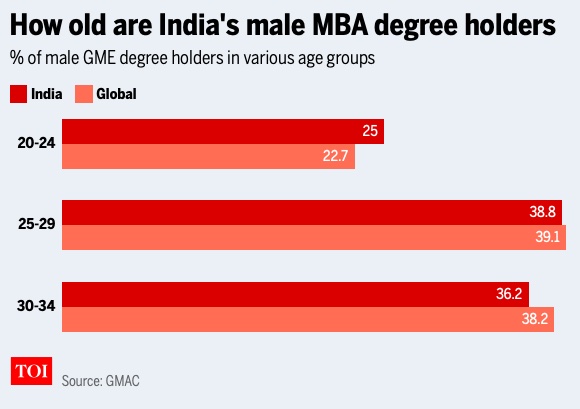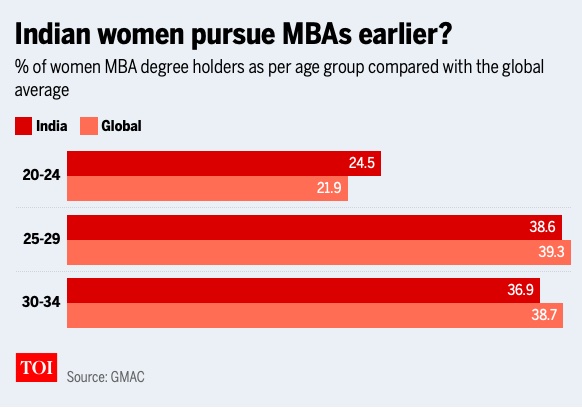Management Education: India
This is a collection of articles archived for the excellence of their content. |
Contents |
Reasons for studying management
Manash Gohain, Indians see MBA as ticket to jobs abroad, Dec 21, 2016: The Times of India
About 29% of Indians aspiring for a management degree are actually aspiring for global assignments, another 26% of the aspirants are seeking respect out of graduate management education (GME). Nearly one fifth of the aspirants are looking for skill upgrades, and in comparison to 13% of global aspirants, just 1% of Indians are looking at a B-school degree as a career revitaliser. And a significant 8% of Indian aspirants see an MBA degree as their ticket to an improved socio-economic strata.
A first ever candidate segmentation survey by Graduate Management Admission Council (GMAC) decodes why someone pursues or aspires to be an MBA. Shared exclusively with TOI, the study was conducted across 15 countries including the US, UK, Russia, China and India among others.Unlike previous GMAC studies, where majority of the respondents are from GMAT (the admission test for top global Bschools) and Graduate Record Examinations (GRE) schemes, this time out of the total only 43% of the respondents have taken or are planning to take either of the tests.
The motivation factor for Indian aspirants for a GME are very similar to that of the US aspirants, while reasons for pursuing an MBA degree for a Chinese aspirant is significantly different with nearly half of the Chinese respondents looking at the degree as a career revitaliser. For Indian aspirants, as the study revealed, bulk of the candidates are “global strivers“ and “respect seekers“. Skill upgradation and innovation are also in the priority zones, serving as motivation for 19% and 12% of aspirants respectively .
“For a long period of time B-schools around the world looked at students in terms of demographics gender, age, nationalities, but didn't get to the core motivation behind why people want to study graduate management education.After all being a man or a woman doesn't drive them. What drives them is a particular type of aspiration. So we thought the time was right as the market has overall matured as to really look at the global candidate market place from segmentation point of view,“ said Sangeet Chowfla, president and CEO, GMAC.
The respondents were interviewed in local languages “in order to remove the bias that comes out of language,“ said Chowfla.
Destinations preferred for management education
2020
Hemali Chhapia and Manash Pratim Gohain, April 1, 2021: The Times of India

From: Hemali Chhapia and Manash Pratim Gohain, April 1, 2021: The Times of India
From: Hemali Chhapia and Manash Pratim Gohain, April 1, 2021: The Times of India
Even as the US is the preferred destination for Indian management aspirants, desi students are more likely to consider a business school closer home (21%) due to the pandemic than consider online learning (5%).
The UK, with its one-year management programme, is a lesser favourite at number three with candidates unsure of whether they would have to complete the entire programme online if the pandemic continues. Interestingly, the top post-MBA career goal for Indians is to work for a company where they can travel internationally.
Interest in graduate management education programmes in 2021 continued to grow —a trend that coincided with waning concerns about the impact of Covid, according to a report published on Wednesday by the Graduate Management Admission Council (GMAC).
Full-time MBA most popular course
The survey showed 76% Indian respondents do not plan to change their original plans due to the pandemic. Globally, a third of international MBA aspirants (73%) are not likely to change their plans in favour of an alternative such as online learning or a business school closer home than those keen on a business master’s (68%). Only one in eight (13%) candidates who wish to fly out for an MBA is willing to consider online learning compared with one in three (30%) domestic candidates.
Specifically, 41% of international candidates who plan to pursue a business master’s programme report they are very or extremely concerned about the impact of Covid-19 compared with 27% domestic candidates.
Domestic candidates report more willingness to consider alternatives such as staying closer to home or adopting online learning. Domestic candidates for MBA (28%) and business master’s (30%) programmes indicated they are more willing to consider a business school closer home to pursue their degree in 2021. “In sum, the pandemic is compelling some candidates to consider alternatives; however, they are not giving up on their career aspirations for pursuing GME in 2021,” noted the GMAC report. “As vaccines become increasingly available, prospective students around the world are seeing light at the end of the tunnel regarding the global pandemic,” said Sangeet Chowfla, president and CEO of GMAC. “It is especially encouraging to find female candidates seeking advanced business degrees despite the unique challenges and barriers they face due to Covid-19.”
The 2021 report analyses the data collected between July and December 2020 from a total of 2,515 (330 from India) individuals worldwide planning to pursue GME.
The council’s 2021 Prospective Students Survey Report found the proportion of respondents reporting they are extremely or very concerned about Covid-19 declined from 41% to 33% over the survey period.
Full-time MBA remains the most popular programme as 42% candidates reported it as their preferred option. The full-time one-year MBA is the preferred programme for candidates planning to study in Canada (26%), France (27%), Spain (38%), and the UK (28%). A full-time two-year MBA, though, is the preferred programme for candidates planning to study in the US (33%).
Employment prospects of MBAs
2015-17: 50% MBAs fail to get job
Hemali Chhapia, 1 in 2 MBAs fails to land a job , The Times of India, August 14, 2017

B-Schools Struggle With Old Content
On the academic floor, the MBA programme was once supreme. Unambiguously , it became the definitive must-have, attracting not only those interested in business but also those who wanted to master the tools of management.
The last few years, though, have proved to be rough. Data from across the country shows the payoff of this course has not been promising. Almost one of two MBA graduates is not placed and unemployment is rising.
The year 2016 saw 75,658 students get jobs on campus.There is no clarity on what happened to the equally large number of those who signed up for the course in 3,080 colleges spread across India.
“Some students who don't get placed take up small jobs; others get placed in some company one or two years after graduating. Now, with mandatory internships, we feel the situation will improve,“ said Anil Sahasrabudhe, chairman, All India Council of Technical Education.
While IIMs see 100% placement, graduates from tier-B schools don't quite make the mark, say recruiters. Many who don't get into the top schools don't settle for a second-rung college either.The fallout has been the closure of 233 B-schools. Last year, an Assocham study said only 7% of MBA graduates from Indian Bschools, excluding those from the top 20 colleges, get a job straight after their course.
“Lack of quality control and infrastructure, low-paying jobs through campus placement and poor faculty are the major reasons for India's unfolding B-school disaster. The need to re-train faculty is practically absent in many B-schools, often making the course content redundant,“ the study noted.
Little wonder then that AICTE has recommended yearly curricula revision, three mandatory internships, courses in technical and soft skills, encouraging of startups, reforming exam systems and regular teacher training.
Fees, scholarships
2016: Fees rise, scholarships ebb
The Times of India, May 27 2016

Hemali Chhapia
Inputs from Ashish Chauhan (Ahmedabad), Pavan M V (Bengaluru), Somdutta Basu (Kolkata), Prashanth (Kozhikode), Yudhvir Rana (Punjab) and Isha Jain (Lucknow)
Becoming an MBA gets tougher as fees rise, scholarships ebb
In a double whammy for management students, fees of the top schools have risen significantly even as scholarship disbursal on the campuses has slipped.
The Indian School of Business (ISB) is the latest to raise its fee for an MBA degree to Rs 24 lakh. Its move followed the IIMs', which cit ed rising costs and shrinking government funds to up their sticker rate. The increases come even as almost one in every three freshmen is unable to pay the fees and needs loans or scholarships, said a faculty member.
In 2009-10, IIM-Ahmedabad handed out fee waivers amounting to Rs 8.3 crore on the basis of annual family income. That has halved. Last year, 239 students got schol arships and the college handed out Rs 4.8 crore. For 2016-17, financial aid is being offered to 251 PGP and PGPFABM students, 29% of the total student strength.
At IIM-Bangalore, 45 students of the 414 in the 2015-17 batch were granted financial aid. Eight got 100% tuition fee waiver for the full course of two years The Indian School of Business (ISB) on Thursday defended its fee hike, but offered a sweetener. There will be an increase in the number of scholarships at the institute. Currently 10% of the class gets aid; for the incoming batch of 2017, 15% will get scholarships. “While we had a marginal increase last year, this is the first significant fee hike in the last four years. We feel it is time for a correction,“ said Prof Dishan Kamdar, deputy dean (academic programmes), ISB.
“Increasing fees is not a sustainable way to build corpus and meet the demands of the future,“ said former IIMKozhikode director Debashis Chatterjee, who is now a tenured professor of Human Resources Management at IIMLucknow. “At the same time, there is no denying the fact that costs are increasing and capital expenses are huge.But institutes must devise innovate ways to raise money.“
What is evident is that scholarships are taking a hit at most top schools. IIM-Indore awarded need-based scholarships worth Rs 162.9 scholarships worth Rs 162.9 lakh to 53 candidates in 201213. It dropped to Rs 114.1 lakh in 2014-15 to 42 students.
IIM-C has raised its fees by over 17%. “IIM-C had no option over 17%. “IIM-C had no option but to go for a steep hike. We have had to increase salaries of professors. We have had to take into account the basic inflation. Maintenance cost has gone up, the Seventh Pay Commission recommendations have to be implemented, the cost of academic licences and software has also increased.All these prompted the BoG to hike the course fee considerably, even more than the proposed amount,“ said an official.
Help has come, unexpectedly , from the government in 2016. IIM-A claimed it had set aside Rs 6 crore for scholarships, but handed out aid worth Rs 4.8 crore as 22 students withdrew and availed the need-based scholarship for SCST students given out by the Centre, said a statement.
India’s place in the world
Financial Times Masters in Management (FT MiM) list
2025
Manash Gohain, Sep 9, 2025: The Times of India
New Delhi : Seven of the world’s top 10 Bschools in terms of weighted salary (average alumni pay three years post-graduation, adjusted across industries) are from India — up from six last year — with IIM-Ahmedabad ($181,239) leading the pack, followed by IIM-Bangalore ($173,707) and IIMCalcutta ($164,383). IIM-A has topped the salary metric for the third straight year.
However, in overall rankings, Indian B-schools remain far from the benchmark set over a decade ago when multiple IIMs regularly featured in the global top 20 of the Financial Times Masters in Management (FT MiM) list.
The number of Indian schools in the top 100 dropped from 14 in 2024 to 11 in the latest 2025 edition. IIM-Bangalore, at 28th and tied with the University of Mannheim, Germany, re-entered the top 30 for the first time since 2021.
The 2025 tally of 11 institutions matches 2023 and is the second best in the past decade, after 2024’s 14. Yet the showing remains below par compared with earlier highs. The best overall ranks for Indian Bschools came in 2016 when IIM-Ahmedabad (16th) and IIM-Bangalore (19th) both made to the top 20, while IIM-Calcutta was placed 23rd. IIM-A’s best performance was seventh in 2011, followed by 10th in 2012 — the last time any IIM cracked the top 10.
This year, apart from IIM-Bangalore, the only Indian schools in the top 40 are IIM-A (34th) and SP Jain Institute of Management and Research (35th). IIM-Calcutta, which ranked as high as 17th in 2019, has slipped to 41st.
On a specific parameter, SPJIMR is India’s best performer — ranked third globally in career services, which measures alumni advancement in seniority and organisation size. IIM-Ahmedabad and IIMCalcutta are sixth and ninth, respectively. Placement is a standout: all 11 Indian schools in the top 100 reported 100% employment or job offers within three months of graduation, a record unmatched even by the top four schools (University of St Gallen, Switzerland; HEC, Paris; INSEAD, France; and Nova School of Business and Economics, Portugal).
Indian schools also outperformed on faculty doctorates, with seven reporting 100% and the others at 95%.
Management Masters degree
16% of Masters degree holders are from India
Manash Pratim Gohain, Oct 28, 2021: The Times of India

From: Manash Pratim Gohain, Oct 28, 2021: The Times of India

From: Manash Pratim Gohain, Oct 28, 2021: The Times of India

From: Manash Pratim Gohain, Oct 28, 2021: The Times of India

From: Manash Pratim Gohain, Oct 28, 2021: The Times of India

From: Manash Pratim Gohain, Oct 28, 2021: The Times of India

From: Manash Pratim Gohain, Oct 28, 2021: The Times of India
Of the 150 lakh people aged between 20 and 34 who hold a graduate management education (GME) master’s degree, 15.6% (23.4 lakh) are Indians. India is among the top 10 nations when it comes to students pursuing MBA and equivalent courses, but the number of women opting for these courses is lower than the global and regional averages.
These findings came from the first-ever global study of diversity conducted by the Graduate Management Admission Council (GMAC), which conducts the GMAT exam. The ‘Global Diversity of Talent – Attainment and Representation’ report looked at students pursuing these courses in 69 countries.
Globally, of the over 6.1 crore students believed to have obtained a master’s degree, approximately 24% had them in management. In absolute terms, India is only behind China when it comes to the number of persons aged 20-34 who have GME degrees.
When it comes to women with these degrees, again India and China are on top.
India is also second only to the US when it comes to the number of those pursuing GME degrees online.
However, despite the high number of women pursuing these degrees in India and China, these countries don’t even feature in the top 10 nations with the highest percentage of women GME degree holders.
India even trails South Asian peers like Nepal, Bhutan and Bangladesh on this metric.
The report also shows that of the total number of Indian students, the number pursuing master’s courses in business is a very tiny percentage.
In almost all age categories of GME degree holders, Indian women trail men.
Indians also choose to pursue these courses earlier than their global peers.
And that’s true of both Indian men and women.
2024 (for 2025)
Manash Gohain, Sep 26, 2024: The Times of India
New Delhi : Four Indian full-time MBA programmes have made it into the top 100 in QS’s Global Rankings for 2025. Leading the Indian cohort is IIM Bangalore, which dropped to 53rd from 48th last year. In total, 14 Indian MBA programmes have secured a spot in the QS rankings, including three new entries: IIM Kozhikode, debuting in the 151-200 band, and the Institute of Management Technology, Ghaziabad, along with Somaiya Vidyavihar University, appearing in the 251+ band.
Other Indian programmes in the top 100 include IIM Ahmedabad at 60 (down from 53), IIM Calcutta at 65 (down from 59), and the Indian School of Business at 86 (down from 78). Despite these declines, three Indian institutions rank in the global top 50 for employability, with IIM Bangalore leading in alumni impact.
The QS Quacquarelli Symonds, a global higher education analyst, released the 2025 rankings for MBA and Business Master’s programmes. These rankings underscore India’s growing presence in global business education, with 14 MBA programmes making it to the list. The QS Global MBA and Business Master’s Rankings for 2025 span 58 countries and territories, eval- uating 340 top MBA programmes and specialised master’s degrees in areas such as management, finance, marketing, business analytics, and supply chain management.
Three Indian MBA programmes stand among the world’s top 50 for employability: IIM Bangalore (33), IIM Calcutta (34), and IIM Ahmedabad (47), with a fourth Indian programme making it into the top 100 for this key indicator.
IIM Bangalore’s fulltime MBA programme delivers the highest return on investment in India, ranking 53rd globally. IIM Ahmedabad and IIM Calcutta also feature in the world’s top 100 for ROI. However, Indian institutions face challenges, particularly in student and faculty diversity. None of the 14 Indian programmes ranked among the top 250 globally in this area, highlighting a need for greater internationalisation. Regionally, India dominates Asia’s rankings with 14 programmes, followed by Mainland China with 10, further solidifying India’s role in the region’s business education ecosystem.
2025 (for 2026)
QS
Manash Gohain, Sep 17, 2025: The Times of India
New Delhi : Indian business schools have made gains in QS Global MBA, Business Master’s and Online MBA Rankings 2026, to be released Wednesday, with three of them breaking into the list of world’s top 100 MBA schools and three others making their first appearance in the online MBA league table. Yet, experts caution challenges relating to employability and return on investment continue to limit India’s global edge.
IIM-Bangalore retained its top national spot, climbing one place to 52nd rank globally — it reached its peak ranking of 44 in 2020. It posted its best-ever employability score, ranking 29th worldwide. IIM-Ahmedabad rose to 58th rank, while IIMCalcutta followed at 64th. IIM-Indore also improved its position, moving into the 151-200 bracket, its best performance since it first appeared on the list in 2022. In all, 14 Indian institutions made it to the global MBA table this year. Woxsen School of Business debuted at joint 26th for diversity, topping Asia in this category.
India also expanded its presence in QS Business Master’s Rankings, with 37 programmes listed and 10 new entries. IIMs Bangalore (7), Ahmedabad (11), and Calcutta (12) all ranked within the world’s top 15 in master’s in management, underlining India’s growing strength in this specialised field. IIMs Lucknow (30), Kozhikode (48) and Indore (50) also figured in top 50, though none of the country’s entries in finance managed to break into the top 200. A highlight was debutant TAPMI ranking 22nd on return on investment.
For the first time, India entered QS Online MBA Rankings. IIM-Kozhikode debuted at 53rd, MRIIRSwas in the 76-100 bracket, and Goa Institute of Management in 101+. Nunzio Quacquarelli, president, QS, said India’s performance reflected “significant strides”.
MBA as a degree
2019: IIM-A students get MBA degree
March 17, 2019: The Times of India
The 54th convocation of Indian Institute of Management, Ahmedabad (IIM-A) on Saturday was historic for the institute and students. After over half a century, the students were awarded a degree of Master of Business Administration (MBA) instead of Post-Graduate Programme (PGP) in Management diploma.
Country’s premier management institution awarded its first masters degree after the IIM Act-2017 became a law in December 2017. IIM Bangalore and Calcutta also conferred MBA degrees in their last convocation. Sources said previous students too wanted a similar degree with retrospective effect, but the institute said the move is not possible. However, the institute is now also planning to hike it fee for the flagship course. IIM-A director Errol D’Souza said the Governing Council had approved fee hike of 4.5%; the MBA course would now cost students Rs 22 lakh instead of Rs 21 lakh. “The decision has been taken keeping in mind the inflation rate,” said the director.
Women
2013-17: 50% rise in girls taking IIM entrance
Yogita Rao, 50% jump in girls taking IIM entrance in 5 yrs, November 27, 2018: The Times of India
CAT 2018, the entrance test for IIMs, saw 50% more women candidates than six years ago. This year, 84,350 women registered for the Common Admission Test (conducted on November 25) compared to 56,409 in 2013. Women also contributed to over 50% growth in total registrations from 2017. In all, there were 2.41 lakh aspirants this year, compared to 2.29 lakh last year, of whom 78,009 were women. Of the 12,000 more candidates who registered, 6,300 were women, revealed CAT registration data for the two years.
CAT convener Sumanta Basu from IIM Calcutta (which conducted this year’s test) said, “The IIMs are consciously giving leverage to women to increase diversity in classrooms. We want more women in our institutes.”
The jump was the highest in 2015, when women candidates went up from 69,176 the previous year to 76,704. But overall registrations too had gone up significantly, by over 20,000, in 2015.
The IIMs have been reserving seats for women and non-engineers to make classes diverse. IIM-Kozhikode was the first to set aside seats for women, in 2013.
‘Steady rise in number of girls in tutorials too’
That year, 54% of the institute’s PGP (postgraduate programme in management) batch of 361students comprised women; also, 60% of summer placement jobs went to them, said director Debashis Chatterjee.
“A study has shown that there is no correlation between managerial positions and mathematical ability. There will be a gradual switch in the coming years, when class strength will be tilted in favour of girls,” said Chatterjee. IIMs have changed their eligibility criteria over the years. The weightage given to CAT differs for all IIMs. The parameters considered for shortlisting candidates for group discussion, personal interview and written ability test also include Class X and XII scores. “Girls do better in school and higher secondary classes, but as families prefer sending boys for coaching for preparation of entrance exams, they may be doing better there,” said Chatterjee. Most IIMs even give about 5% additional points while shortlisting for gender diversity in classrooms.
Prashanth Nair, centre director for Mumbai in a leading coaching institute, said they have seen a rise in the number of girls in their coaching class.